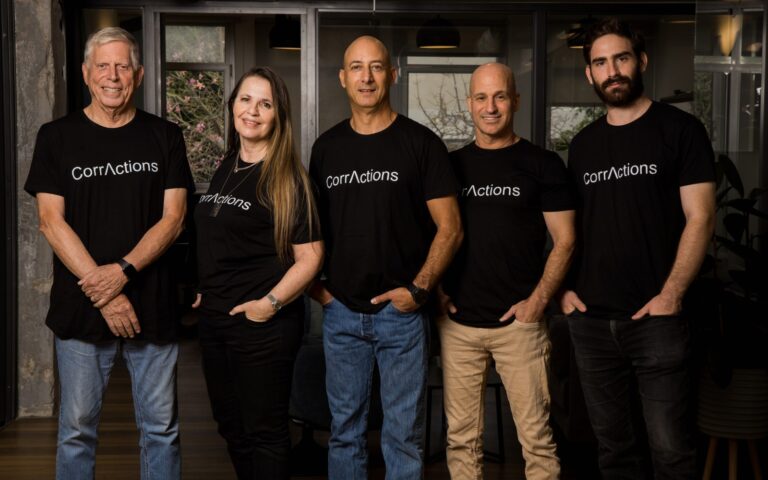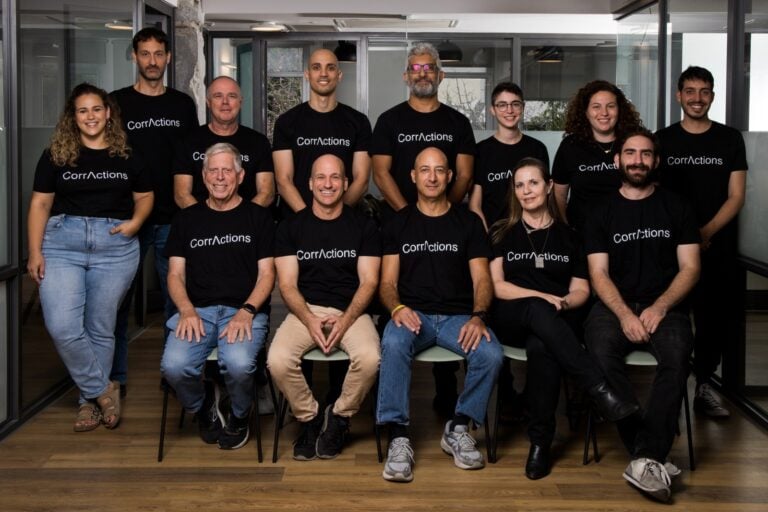You’ve had too much to drink. Or maybe you didn’t sleep the night before. Both represent cognitive states of impairment that should keep you from getting behind the wheel. But who’s going to stop you?
Israeli startup CorrActions says it’s the car itself that should strongly state, “Sorry, mate, tonight you should take a taxi home.”
But how will the car recognize how many cocktails you’ve imbibed or how many hours of shuteye you got?
The steering wheel knows
The steering wheel knows, the company’s CEO, Ilan Reingold, tells ISRAEL21c.
“Every modern car that’s manufactured these days has sensors embedded in the steering wheel. You just need to touch it; you don’t even have to drive.”

Our bodies generate micromotions we’re not even aware of, Reingold explains. These come from electrical brain activity that affects the motor cortex (thus allowing us to walk and talk). These same electrical signals can “leak” out, unconsciously, resulting in micromotions that sensors, like those in a steering wheel, can detect.
“We’re kind of vibrating our brain activity,” Reingold explains.
Different cognitive impairments result in different micromotions, which CorrActions software can read and process in seconds with, Reingold claims, 90% accuracy “and close to zero false positives.”
CorrActions is a software-only solution. The company relies on the sensors already in today’s smart, connected cars. In addition to the steering wheel, there are sensors in the seats – that’s why your car beeps if you haven’t fastened your seatbelt – and, increasingly, cameras or in-cabin radar to determine who’s driving and whether they’re paying attention.
Are you paying attention?
The latter will play a more prominent role as semi-autonomous vehicles proliferate. Unlike fully self-driving Level 5 cars, Level 2, 3 and 4 of the autonomy pyramid (Tesla’s full self-driving feature is Level 2, despite the misleading moniker) require the driver’s eyes on the road in case action is required.
What can CorrActions – the corporate name suggests “corrections” – do to improve a situation where a driver shouldn’t be operating a motor vehicle?
There are a number of options, Reingold tells ISRAEL21c.
- The vehicle could simply be “locked” and not start.
- The vehicle’s speed could be limited.
- Braking could be adjusted to increase the space between the car and the one in front of it.
CorrActions delivers the data, but the car manufacturer has to build the interface between its mechanical systems and CorrActions’ software.
Motion sickness
When self-driving vehicles become more mainstream, whether fully or semi-autonomous, there’s an issue that’s flown mostly under the radar, so to speak: passenger motion sickness.
If CorrActions’ software detects that passengers are feeling queasy, it can route the vehicle to a more comfortable itinerary, in terms of the number of turns, acceleration and even potholes along the way.
This applies to cars with drivers, as well, who can be prompted by the vehicle’s GPS to take a less nauseating route.
“We’re agnostic to the dynamics of the market between human driving and the transition to fully autonomous,” Reingold notes.
“For now, the problem we’re solving is human drivers. That will be true for at least 10 years.”
Executive team
The core technology for CorrActions is based on research conducted over many years by cognitive neuroscientist Eldad Hochman, who received his PhD from the University of Haifa.
Hochman left a job at McGill University in Montreal and returned to Israel after 15 years to found CorrActions with business executive Zvi Ginosar in 2019. Reingold joined in 2022. He previously was the chief business officer for Sony’s IoT (Internet of Things) division and a general manager of Broadcom.

Hochman’s research wasn’t specific to the automotive industry – there are applications for sensing cognitive states via micromotions in healthcare, in factories and warehouses, even from your smartwatch or smartphone.
“We thought our solution would have the most significant impact in terms of saving lives in the automotive industry,” Reingold says. “Some 25% of accidents with casualties are due to drunk drivers. If we can detect that and have the car change its behavior accordingly, we’re doing something important.”
CorrActions recently raised $7.25 million from Volvo Cars Tech Fund, NextGear, OurCrowd and BlackBerry.

Reingold tells ISRAEL21c that the war with Hamas didn’t impact the company’s ability to raise money. “We were mostly affected by the downturn in the global economy.”
All of which makes the current Series A all the more impressive.
BlackBerry was known for its keyboard-sporting mobile phones that were the industry standard until Apple unseated the company’s dominance with the iPhone in 2007. BlackBerry pivoted to employ its secure communications protocol to power the Internet of Things and to lock in hacker-proof operating systems.
BlackBerry is now one of the top providers of over-the-air (OTA) update technology for cars – that’s where a vehicle’s functionality can be improved with a software change in the background – similar to when your phone or computer updates overnight. CorrActions is working to “pre-integrate” its software with the BlackBerry IVY platform, so carmakers can get up and running faster.
Getting closer to market
Hyundai and Volkswagen both announced that they are signed up to use CorrActions software. Another 10 unnamed manufacturers are trialing the software, which Reingold described as “beyond proof of concept. We’re now going through the maturation and industrial stages with our manufacturing partners necessary to get it into consumer vehicles in about a year.”
There are other technologies that can detect a driver’s cognitive state, but those are mainly hardware-based. “We haven’t seen another software-only solution,” Reingold says.
Tel Aviv-based CorrActions employs 20, mostly software engineers and data scientists.
While CorrActions will focus on cars for the near term, Hochman has in past interviews pointed out that the company’s algorithms could alert athletes or the elderly when they may be at risk of injury or fall. It could be used in the defense industry to assess a fighter pilot’s performance.
By monitoring unconscious micromotions, CorrActions can “predict a rapid deterioration seconds before it occurs,” Hochman says.
“That means we can quantify the level of fatigue, intoxication, exhaustion or lack of concentration at any given moment.”
That’s relevant whether you’re driving a car, giving a TED Talk or simply walking on a crowded sidewalk in Manhattan.
Want your car to sense your micromotions? Learn more about CorrActions here or visit the company’s booth at the January 2024 Consumer Electronics Show (CES) in Las Vegas.
















